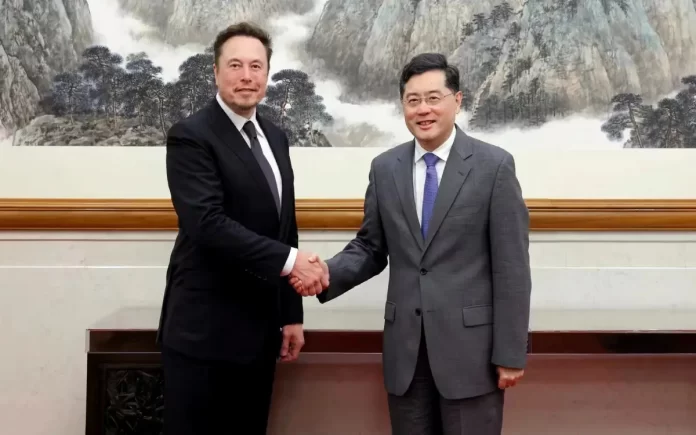Tesla announced that regional Chinese authorities have lifted constraints on its vehicles manufactured in China, following the successful compliance of the company’s cars with the nation’s stringent data security standards. This breakthrough coincides with Tesla CEO Elon Musk’s unexpected visit to Beijing, where he held discussions with Chinese Premier Li Qiang amid the city’s first major auto show in four years.
Tesla’s electric cars, despite their immense popularity in China, faced bans from certain government-related properties over concerns regarding data collection by the U.S.-based automaker.
While Tesla’s press release did not specify the exact authorities responsible for lifting the restrictions, it marks a pivotal moment as the Biden administration conducts a probe into potential national security risks posed by imported cars from China due to data collection capabilities.
“I’m a big fan of China. I have to say that. I also have a lot of fans in China, well the feelings are reciprocated.” 一 Elon Musk
Notably, Tesla’s vehicles were not the sole beneficiaries of this regulatory shift. Alongside Tesla’s Model 3 and Model Y, several new energy vehicles from manufacturers like BYD, Lotus, Nezha, Li Auto, and Nio also passed China’s rigorous data security assessments, as confirmed by the China Association of Automobile Manufacturers and the National Computer Network Emergency Response Technical Team/Coordination Center of China.
The newly implemented data security requirements, introduced in November, apply to “connected vehicles” released in 2022 and 2023, with automakers voluntarily submitting their models for inspection. These rules assess various aspects, including anonymization of facial recognition data, cockpit data collection protocols, and user notification of personal information processing.
Tesla’s compliance with these regulations underscores its commitment to data security, including the localization of data storage at its Shanghai facility and adherence to international information security standards.
Amidst Musk’s visit to China, expectations rise regarding the potential availability of Tesla’s Full Self Driving software in the country. However, industry analysts caution that the rollout of a supervised version of FSD in China faces significant hurdles, citing challenges for Tesla as a foreign entity operating in China’s highly competitive market.
Premier Li’s visit to domestic companies like Xpeng during the auto show emphasizes the government’s focus on innovation and domestic demand to drive production, signaling a broader strategic shift within China’s automotive industry.
While Tesla is notably absent from this year’s auto show, the event serves as a platform for showcasing local innovation and technological advancements amidst the evolving landscape of China’s automotive sector.



